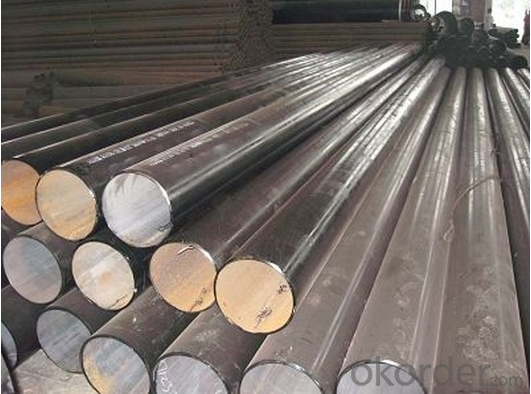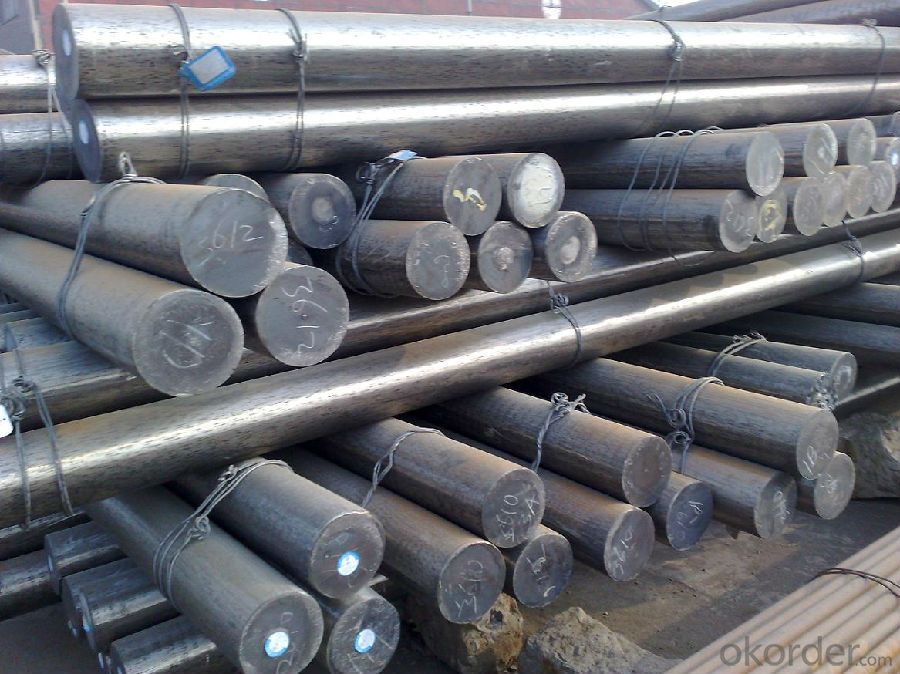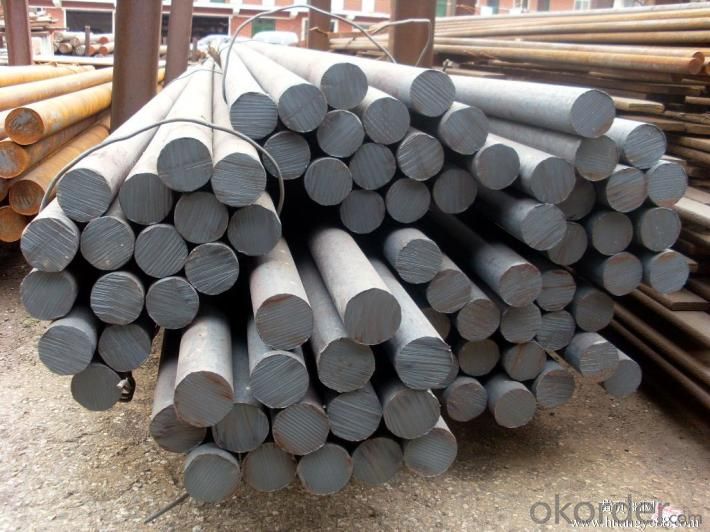SCM440 Alloy Steel Bar Hot-Rolled Bar
- Loading Port:
- Tianjin
- Payment Terms:
- TT OR LC
- Min Order Qty:
- 25 m.t.
- Supply Capability:
- 500000 m.t./month
OKorder Service Pledge
OKorder Financial Service
You Might Also Like
Item specifice
SCM440 Alloy Steel Bar Hot-Rolled Bar
Product Description:
1. Commodity: Round steel bar
3. Technical: Hot rolling
2. Length: Min. 5.8meter, according to requirement.
3. Diameter: 16mm-250mm
5. Packing: In Bundle or according to your requirements.
4. Standard: GB/T 3077-1999(42CrMo) ; JIS SCM440; DIN 42CrMo4 ; ASTM 4140 ; BS 708M40
Chemical Composition(%):
C | Si | Mn | Cr | Mo | Ni | P | S |
0.38-0.45 | 0.17-0.37 | 0.50-0.80 | 0.90-1.20 | 0.15-0.25 | ≤0.030 | ≤0.030 | ≤0.030 |
Standard:
GB | AISI | DIN | JIS | ISO |
42CrMo | 4140 | 42CrMo4 | SCM440 | 42CrMo4 |
Available Size:
Rolled round bar | φ20-120mm × L |
Forged round bar | φ130-195mm × L |
Application:used for various large-size or medium-size precision plastic mould and low melting
point alloy parts
The steel with high strength and toughness, hardenability is better also | |||||||
After conditioning treatment quenching deformation of small | |||||||
high fatigue limit and repeated impact resistance |
Quality Certificate:we can supply quality certificate
Packaging:standard seaworthy packing or as customer require
Delivery: In 7-10 days after we receive 30% deposite
Product show:



- Q:What are the different cryogenic grades of special steel?
- There are several cryogenic grades of special steel, including but not limited to, austenitic stainless steel (such as 304L and 316L), ferritic stainless steel (such as 410 and 430), and martensitic stainless steel (such as 440C). These grades are specifically designed to maintain their mechanical properties and resist brittleness at extremely low temperatures.
- Q:How does special steel contribute to the heavy equipment industry?
- Special steel contributes to the heavy equipment industry by offering enhanced strength, durability, and resistance to wear and tear. It enables the production of high-performance components and parts, such as gears, axles, and blades, that can withstand heavy loads, extreme temperatures, and harsh environments. The use of special steel in heavy equipment ensures improved safety, increased productivity, and longer service life, making it a critical material for the industry.
- Q:What are the different special steel products available in the market?
- In the market, one can find a wide range of special steel products that are specifically designed to meet various industrial needs. Some commonly used special steel products include: 1. Stainless Steel: This particular steel alloy is highly resistant to corrosion due to its minimum chromium content of 10.5%. It finds extensive use in applications that demand exceptional corrosion resistance, such as kitchen utensils, medical instruments, and chemical processing equipment. 2. Tool Steel: Tool steel is a type of carbon and alloy steel that is exclusively manufactured for tool production. It is renowned for its high hardness, resistance to abrasion, and ability to maintain sharp edges. Tool steel is widely employed in the fabrication of cutting tools, dies, and molds. 3. Alloy Steel: Alloy steel is a type of steel that has been blended with other elements like manganese, silicon, nickel, or chromium to enhance its mechanical properties. It offers superior strength, toughness, and wear resistance compared to carbon steel. Alloy steel is used in various applications, including automotive components, construction equipment, and machinery parts. 4. High-Speed Steel: High-speed steel is a variant of tool steel that exhibits the ability to cut at high speeds without compromising its hardness or its ability to retain sharp edges. It is commonly utilized in the production of drills, milling cutters, and saw blades. 5. Spring Steel: Spring steel is a low-alloy, medium or high carbon steel that possesses remarkable shape retention and elasticity even under high stress or repeated loadings. It finds extensive use in the manufacturing of springs, suspension systems, and shock absorbers. 6. Electrical Steel: Electrical steel, also known as silicon steel, is an exceptional steel alloy that demonstrates low electrical losses and high magnetic permeability. It is employed in the fabrication of electrical transformers, motors, and generators. 7. Heat-Resistant Steel: Heat-resistant steel is specifically engineered to withstand high temperatures without compromising its mechanical properties. It is commonly utilized in applications such as furnaces, heat exchangers, and gas turbines. These examples merely scratch the surface of the wide array of special steel products available in the market. The selection of a particular steel product depends on the specific requirements of the application, including factors like corrosion resistance, strength, hardness, and heat resistance.
- Q:How does special steel contribute to the manufacturing of precision instruments?
- Special steel plays a crucial role in the manufacturing of precision instruments by providing exceptional strength, durability, and resistance to corrosion. Its unique properties allow for the production of intricate parts and components that require high precision and accuracy. Additionally, special steel offers excellent heat resistance and stability, ensuring consistent performance and reliability of precision instruments in various demanding environments and applications.
- Q:Can special steel be used in the production of gearboxes?
- Yes, special steel can be used in the production of gearboxes. Special steel alloys such as alloy steel or stainless steel provide enhanced strength, durability, and resistance to wear and corrosion, making them ideal for manufacturing high-performance gearboxes that can withstand heavy loads and harsh operating conditions.
- Q:What are the main factors affecting the fatigue strength of special steel?
- The fatigue strength of special steel is influenced by several main factors: 1. Material composition: The chemical composition of special steel plays a significant role in determining its fatigue strength. Alloying elements such as carbon, chromium, molybdenum, and nickel can enhance the material's resistance to fatigue by improving its ability to withstand cyclic loading. 2. Microstructure: The microstructure of special steel, including the grain size, crystallographic texture, and presence of any precipitates or phases, can significantly affect its fatigue strength. Fine-grained structures generally exhibit higher fatigue strength due to reduced stress concentrations and improved resistance to crack initiation and propagation. 3. Surface condition: The surface finish and integrity of special steel can have a significant impact on its fatigue strength. Surface defects, such as scratches, notches, or roughness, can act as stress concentrators and initiate fatigue cracks. Proper surface treatments, such as grinding or shot peening, can improve the fatigue resistance by reducing stress concentrations and introducing compressive residual stresses. 4. Heat treatment: The heat treatment process used to modify the structure and properties of special steel can also affect its fatigue strength. Proper heat treatment techniques, such as quenching and tempering, can optimize the material's microstructure, improve its hardness, and enhance its resistance to fatigue. 5. Loading conditions: The type and magnitude of cyclic loading applied to special steel significantly influence its fatigue strength. Factors such as stress amplitude, mean stress, load ratio (ratio of minimum to maximum stress), and frequency of loading can all impact the fatigue life of the material. 6. Environmental conditions: The presence of corrosive environments, high temperatures, or other harsh conditions can decrease the fatigue strength of special steel. Environmental factors can accelerate crack initiation and propagation, leading to reduced fatigue life. Proper selection of corrosion-resistant alloys or protective coatings can mitigate the adverse effects of the environment on fatigue strength. By considering and optimizing these factors, manufacturers and engineers can enhance the fatigue strength of special steel, ensuring its reliability and longevity in various applications.
- Q:How is special steel used in the production of hydraulic components?
- Special steel is used in the production of hydraulic components due to its high strength, corrosion resistance, and ability to withstand extreme pressure and temperature conditions. It helps in manufacturing durable and reliable hydraulic parts such as cylinders, valves, fittings, and pistons, ensuring efficient functioning and long-lasting performance of hydraulic systems.
- Q:Can special steel be used in the wind turbine manufacturing industry?
- Yes, special steel can be used in the wind turbine manufacturing industry. Special steel offers superior mechanical properties such as high strength, corrosion resistance, and durability, making it suitable for various components used in wind turbines, including tower structures, shafts, gears, and bearings. By using special steel in wind turbine manufacturing, the industry can enhance the performance and longevity of these renewable energy systems.
- Q:What are the main advantages of using special steel in the aerospace industry?
- The main advantages of using special steel in the aerospace industry are its high strength-to-weight ratio, excellent corrosion resistance, and superior heat and wear resistance. These properties make special steel ideal for constructing aircraft components that need to withstand extreme conditions, such as high temperatures, pressure, and stress. Additionally, special steel offers excellent fatigue resistance, ensuring the longevity and reliability of aerospace structures.
- Q:What are the properties of corrosion-resistant alloy steel?
- Corrosion-resistant alloy steel possesses properties such as high resistance to corrosion, excellent strength, durability, and the ability to withstand harsh environmental conditions. It is resistant to rust, corrosion, and oxidation, making it ideal for applications in industries such as marine, chemical, and oil and gas. The alloy steel also offers good mechanical properties, including high tensile strength and toughness, which ensures its long-term performance and reliability.
1. Manufacturer Overview |
|
|---|---|
| Location | |
| Year Established | |
| Annual Output Value | |
| Main Markets | |
| Company Certifications | |
2. Manufacturer Certificates |
|
|---|---|
| a) Certification Name | |
| Range | |
| Reference | |
| Validity Period | |
3. Manufacturer Capability |
|
|---|---|
| a)Trade Capacity | |
| Nearest Port | |
| Export Percentage | |
| No.of Employees in Trade Department | |
| Language Spoken: | |
| b)Factory Information | |
| Factory Size: | |
| No. of Production Lines | |
| Contract Manufacturing | |
| Product Price Range | |
Send your message to us
SCM440 Alloy Steel Bar Hot-Rolled Bar
- Loading Port:
- Tianjin
- Payment Terms:
- TT OR LC
- Min Order Qty:
- 25 m.t.
- Supply Capability:
- 500000 m.t./month
OKorder Service Pledge
OKorder Financial Service
Similar products
New products
Hot products
Related keywords



























